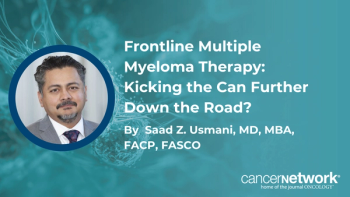
Phase 3 REACH3 Study Meets Primary Endpoint of Superior Overall Response Rate
The study is evaluating ruxolitinib in patients with refractory or steroid-dependent chronic graft-versus-host disease compared to best available therapy.
The phase 3 REACH3 study, evaluating ruxolitinib (Jakafi) in patients with refractory or steroid-dependent chronic graft-versus-host disease (GvHD), met its primary end point of superior overall response rate (ORR) at week 24, compared to best available therapy, according to Novartis.1
In addition, the study also met its key secondary end points by significantly improving failure-free survival and patient-reported symptoms assessed by a validated chronic GvHD-specific score.
“These positive topline results of the pivotal phase 3 trial in chronic GvHD show that treatment with [ruxolitinib] results in superior overall response and failure-free survival compared to alternative treatment options and will help to inform treatment decisions among patients refractory to steroids following bone marrow transplantation,” David Feltquate, head of the Hematology Development Unit at Novartis, said in a press release. “We look forward to sharing further details of the data, which complement the previous findings for [ruxolitinib] in the acute form of the disease, and plan to initiate regulatory filings for steroid-refractory GvHD in Europe and other ex-US countries.”
The randomized, open-label, global, multicenter phase 3 REACH3 study is evaluating ruxolitinib compared to best available therapy in patients with steroid-refractory or steroid-dependent chronic GvHD following allogeneic stem cell transplant. Data from this study are expected to be presented at an upcoming major medical congress.
These positive topline results build on positive data previously observed in the REACH2 trial, which demonstrated that ruxolitinib improved outcomes across a range of efficacy measures in patients with steroid-refractory or steroid-dependent acute GvHD.
In the multicenter, randomized, open-label, phase 3 REACH2 trial, 309 patients with glucocorticoid-refractory acute GvHD were randomized in a 1:1 fashion to receive either 10 mg of oral ruxolitinib twice daily (n = 154) or investigator’s choice of therapy from a list of 9 commonly used options as a control (n = 155).2 The primary end point was overall response at day 28 and the key secondary end point was durable overall response at day 56.
The ORR at day 28 was 62% with ruxolitinib versus 39% in the control group (OR, 2.64; 95% CI, 1.65-4.22; P < 0.001). Durable overall response at day 56 was also higher in the ruxolitinib group than in the control group (40% vs. 22%; OR, 2.38; 95% CI, 1.43-3.94; P < 0.001).
The estimated cumulative incidence of loss of response at 6 months was 10% in the ruxolitinib group, compared to 39% in the control group. Notably, the median failure-free survival was considerably longer with ruxolitinib than with control (5.0 months vs 1.0 month; HR, 0.46; 95% CI, 0.35-0.60).
The median overall survival (OS) was 11.1 months in the ruxolitinib group and 6.5 months in the control group (HR, 0.83; 95% CI, 0.60-1.15). With regard to safety, The most common adverse events (AEs) observed up to day 28 were thrombocytopenia (33% in the ruxolitinib group and 18% in the control group), anemia (30% and 28%, respectively), and cytomegalovirus infection (26% and 21%).
Currently, ruxolitinib is approved by the European Commission for the treatment of adult patients with polycythemia vera (PV) who are resistant to or intolerant of hydroxyurea and for the treatment of disease-related splenomegaly or symptoms in adult patients with chronic idiopathic myelofibrosis (MF), post-polycythemia vera MF, or post-essential thrombocythemia MF.
Moreover, ruxolitinib is already approved in over 100 countries for patients with MF, including EU countries, Switzerland, Canada, Japan, as well as in more than 85 countries for patients with PV, including EU countries, Switzerland, Japan and Canada. However, the exact indication for [ruxolitinib] varies by country. Additional worldwide regulatory filings are already underway in MF and PV.
References:
1. Novartis announces Phase III study of Jakavi® in chronic graft-versus-host disease met primary and key secondary endpoints [news release]. Basel. Published July 23, 2020. novartis.com/news/media-releases/novartis-announces-phase-iii-study-jakavi-chronic-graft-versus-host-disease-met-primary-and-key-secondary-endpoints. Accessed July 23, 2020.
2. Zeiser R, von Bubnoff N, Butler J, et al. Ruxolitinib for Glucocorticoid-Refractory Acute Graft-versus-Host Disease. N Engl J Med. doi: 10.1056/NEJMoa1917635.
Newsletter
Stay up to date on recent advances in the multidisciplinary approach to cancer.






































